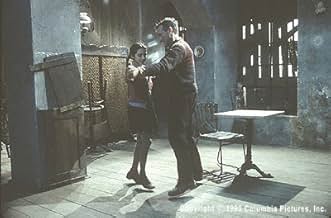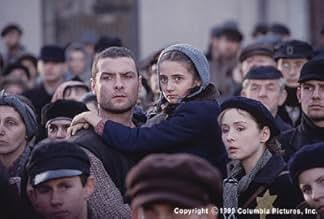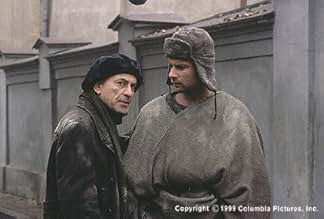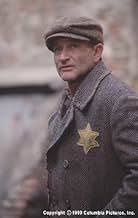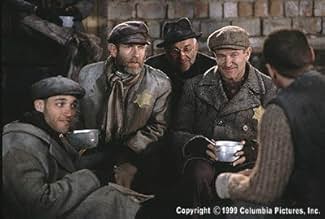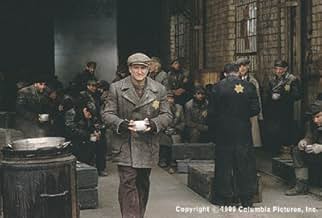Durante la II Guerra Mundial, un habitante normal de un barrio marginal se inventa noticias sobre las ofensivas de los Aliados para dar esperanza a otras víctimas del régimen nazi.Durante la II Guerra Mundial, un habitante normal de un barrio marginal se inventa noticias sobre las ofensivas de los Aliados para dar esperanza a otras víctimas del régimen nazi.Durante la II Guerra Mundial, un habitante normal de un barrio marginal se inventa noticias sobre las ofensivas de los Aliados para dar esperanza a otras víctimas del régimen nazi.
- Premios
- 2 premios ganados y 3 nominaciones en total
- Lina's Mother
- (as Eva Igo)
- Lina's Father
- (as Istvan Balint)
- Samuel
- (as Janos Gosztonyi)
- The Whistler
- (as Adam Rajhona)
- Roman
- (as Peter Rudolf)
- Dirección
- Guionistas
- Todo el elenco y el equipo
- Producción, taquilla y más en IMDbPro
Argumento
¿Sabías que…?
- TriviaThis movie and its 1974 predecessor were both based on the novel "Jakob der Lügner", written in 1969 by the East German author Jurek Becker. As Jews, Becker and his parents were placed in a Polish Ghetto in 1939. In order to save him from deportation, his parents gave the Germans a false birth date; Becker forgot his real birth date and was never able to discover it later in life. Although he was eventually sent to the concentration camps Ravensbrück and Sachsenhausen, both he and his father survived the war; his mother died of malnutrition after being freed from the camp. His novel "Jakob der Lügner" won the Heinrich-Mann Prize for literature in 1971; Becker died in 1997 of cancer.
- ErroresThe train locomotive in the lower left-hand corner of the DVD cover artwork is correct for southern California when the movie was released in 1999, but it's totally wrong for the movie's setting in 1944 Poland. Its cab profile was used on various diesel-electric models built by General Motors for the North American market from the early 1960s onwards, it has 1990s-style dual low-mounted safety lights, and its red-and-gray paint scheme bears an uncanny resemblance to that used by the Southern Pacific Railroad in the western United States in the late 20th century.
- Citas
[first lines]
Jakob Heym: Hitler goes to a fortune-teller and asks, "When will I die?" And the fortune-teller replies, "On a Jewish holiday." Hitler then asks, "How do you know that?" And she replies, "Any day you die will be a Jewish holiday."
- Créditos curiososSpecial thanks to the city and peoples of Piotrków, Poland, the city and peoples of Lódz, Poland and the city and peoples of Budapest, Hungary.
- Bandas sonorasBeer Barrel Polka (Roll Out The Barrel)
Written by Lew Brown, Wladimir A. Timm (as Wladimir Timm), Jaromir Vejvoda & Vasek Zeman
Performed by The Andrews Sisters
Courtesy of MCA Records
By Arrangement with Universal Music Special Markets
There were parts that didn't work for me, especially pieces where narration would have worked better than a character monologue (Jakob is a narrator as well as a character, so why does he talk to himself instead of us so much?) But on the whole, it was a good story, well performed by those involved.
The ending, which I shall refrain from describing for the benefit of any who have not seen it, is absolutely fitting. It is surreal, which may bother some, but leaves the door open to so many interpretations that you will wonder whether to take it as the true end, or whether it was Jakob's final lie. And fittingly, the decision is left in the mind of the viewer.
- Transit
- 13 oct 1999
- Enlace permanente
Selecciones populares
Detalles
- Fecha de lanzamiento
- Países de origen
- Idioma
- También se conoce como
- Una señal de esperanza
- Locaciones de filmación
- Productoras
- Ver más créditos de la compañía en IMDbPro
Taquilla
- Presupuesto
- USD 45,000,000 (estimado)
- Total en EE. UU. y Canadá
- USD 4,956,401
- Fin de semana de estreno en EE. UU. y Canadá
- USD 2,056,647
- 26 sep 1999
- Total a nivel mundial
- USD 4,956,401
Contribuir a esta página




